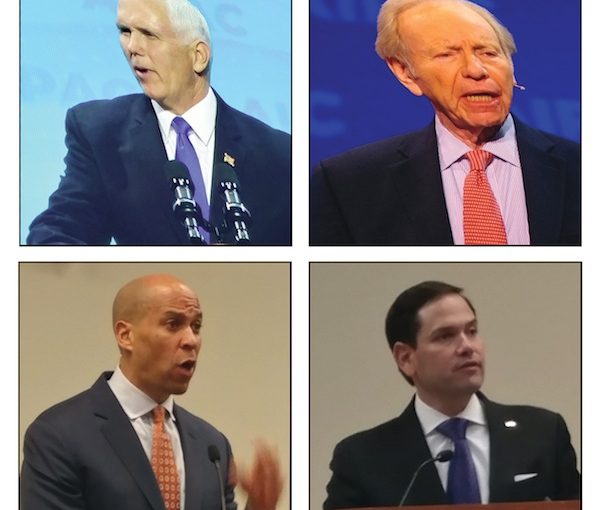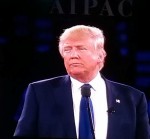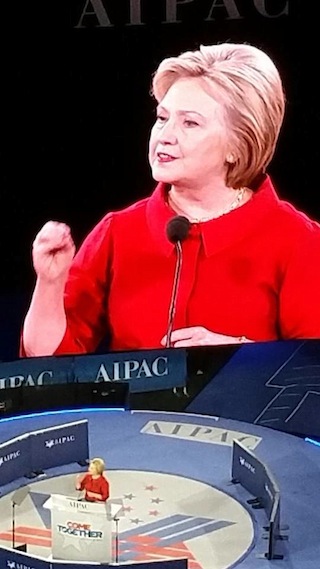Israeli Prime Minister Binyamin Netanyahu addresses AIPAC. (photo by Amos Ben Gershom IGPO via Ashernet)
Washington, D.C.
Israeli Prime Minister Binyamin Netanyahu addressed the AIPAC Policy Conference Monday, presaging his address to the U.S. Congress Tuesday. “Never has so much been written about a speech that hasn’t been given,” he joked, referencing the controversy around his visit.
Netanyahu said the speech was not intended to show disrespect to U.S. President Barack Obama. “I deeply appreciate all that President Obama has done for Israel: security cooperation, intelligence sharing, support at the UN, and much more, some things that I, as prime minister of Israel, cannot even divulge to you because it remains in the realm of the confidences that are kept between an American president and an Israeli prime minister,” he said. “I am deeply grateful for this support, and so should you be.”
He said his purpose in coming was to “speak up about a potential deal with Iran that could threaten the survival of Israel.”
As prime minister of Israel, Netanyahu said, he has a moral obligation to speak up. “For 2,000 years, my people, the Jewish people, were stateless, defenseless, voiceless. We were utterly powerless against our enemies who swore to destroy us. We suffered relentless persecution and horrific attacks. We could never speak on our own behalf, and we could not defend ourselves.
“Well, no more, no more,” he said. “The days when the Jewish people are passive in the face of threats to annihilate us, those days are over.”
Of the controversy that surrounds his visit, and the apparent rift it illuminates, Netanyahu took the opportunity to itemize a long list of historical disagreements between the two allies.
“In 1948, Secretary of State [George] Marshall opposed David Ben-Gurion’s intention to declare statehood. That’s an understatement. He vehemently opposed it. But Ben-Gurion, understanding what was at stake, went ahead and declared Israel’s independence,” said Netanyahu.
“In 1967, as an Arab noose was tightening around Israel’s neck, the United States warned prime minister Levi Eshkol that if Israel acted alone, it would be alone. But Israel did act – acted alone to defend itself.”
He noted, “In 1981, under the leadership of Prime Minister Menachem Begin, Israel destroyed the nuclear reactor at Osirak: the United States criticized Israel and suspended arms transfers for three months. And, in 2002, after the worst wave of Palestinian terror attacks in Israel’s history, Prime Minister [Ariel] Sharon launched Operation Defensive Shield. The United States demanded that Israel withdraw its troops immediately, but Sharon continued until the operation was completed.”
The reason he mentioned all this history, he said, was to make a point. “Despite occasional disagreements, the friendship between America and Israel grew stronger and stronger, decade after decade. And our friendship will weather the current disagreement, as well, to grow even stronger in the future. And I’ll tell you why. Because we share the same dreams. Because we pray and hope and aspire for that same better world. Because the values that unite us are much stronger than the differences that divide us. Values like liberty, equality, justice, tolerance, compassion.”
On Tuesday, Netanyahu addressed Congress, thanking Obama and the United States for support. “This Capitol dome helped build our Iron Dome,” he said.
The day before Purim, he made a parallel between Haman and Ayatollah Khamenei and outlined a litany of Iran’s sins. He warned that the agreement being negotiated “doesn’t block Iran’s path to the bomb, it paves Iran’s path to the bomb.”
If all else fails, the prime minister warned, Israel will do what it needs to do. “For the first time in 100 generations, we the Jewish people can defend ourselves,” he said. “Even if Israel has to stand alone, Israel will stand.” However, he added that he knows Israel does not stand alone because it has the support of the United States, an assertion that received an ovation from the combined senators and congresspeople.
Top of agenda
Fears that the controversy over Netanyahu’s speech to Congress could fragment the historic support for Israel across Democratic and Republican members of Congress pushed bipartisanship up the agenda of the 16,000-delegate AIPAC conference, which ran Sunday to Tuesday.
Former CNN anchor Frank Sesno interviewed Democratic Senator Ben Cardin and Republican Senator Lindsey Graham on stage at the conference, primarily about Iran’s nuclear program. Both politicians were emphatic that the pro-Israel consensus would withstand the tempest.
Cardin insisted that a final agreement must be transparent and allow inspectors on the ground throughout Iran. He favors increased sanctions on Iran if no deal is reached by the March 24 deadline. He said the only reason Iran is negotiating in the first place is because of sanctions and the economic isolation they have put on the country. “We’ve got to keep the heat on,” he said.
“Diplomacy would be the right answer, rather than war,” Graham said, adding that Congress should have the right to vote on the deal. “A bad deal is a nightmare for us, Israel and the world.” He warned that if Iran were to get a nuclear weapon it would lead to a nuclear arms race in the Middle East, with the Sunni countries seeking the same weaponry.
On the reactions to Netanyahu’s visit, the men were unanimous.
“Don’t lose focus,” Cardin said. “The bad guy is Iran.” He urged AIPAC delegates to put pressure on their members of Congress to support proposed legislation that would make it difficult or impossible for countries that boycott Israel to do business with the United States.
Graham, who is chair of the Subcommittee on the Department of State, Foreign Operations and Related Programs, received an ovation when he threatened to cut off money to the UN if vilification of Israel in the General Assembly continues.
The bipartisanship flag was waved again later in the day when Representative Steny Hoyer, the Democratic whip in the House of Representatives, and Representative Kevin McCarthy, the Republican majority leader in the house, spoke.
Lawfare not fair
The 1975 UN General Assembly resolution equating Zionism with racism is that body’s most notorious attack on Israel, said Brett Schaefer, a research fellow at the Heritage Foundation, but there have been 20 condemnatory resolutions against Israel just in this session of the GA alone, compared with three condemnatory resolutions for every other nation.
Likewise, the UN Human Rights Council, he said, has a disproportionate focus on Israel, while ignoring serious human rights abuses elsewhere. The council’s standing agenda has one permanent item on Israel and another item covering every other country on earth.
These institutional attacks on Israel began before the latest round of “lawfare,” Palestinian leaders’ attempts to gain international recognition without negotiating directly with Israel. Schaefer outlined a long list of successful and unsuccessful attempts by the Palestinians to gain legitimacy through the UN and its agencies. Yet such efforts are in direct violation of peace negotiations, which are premised on mutual recognition and negotiation, he said.
While Palestine has been recognized by UNESCO, the UN body on culture, education and science, Schaefer said Palestine is highly unlikely to be recognized as a full member of the GA because membership must be recommended by the Security Council to the assembly and the United States would likely veto such a move.
“What this is about is Palestinians getting what they want without compromise,” he said, noting that the Palestinian leadership has prepared their people to expect nothing less than complete victory and to view compromise as betrayal. However, Schaefer added, “They’ve been pretty successful so far.” The international community is “enabling Palestinians” in avoiding peace negotiations, he said. This includes the Obama administration, according to Schaefer, which puts pressure on Israel to compromise, but not on the Palestinians. “The Palestinians see no downside to what they’re doing right now,” he said, adding that there does not appear to be any reason to change course.
Gil Troy, a professor of history at McGill University, said the UN was founded as a great healing, redeeming instrument promoting the universality of human rights, but it is now a “Third World Dictators’ Debating Society.” A coalition of Soviet-led developing countries hijacked the UN from the democracies decades ago, he said.
With 193 member-states now, Troy said, the UN represents 193 forms of nationalism, but there is only one form of nationalism that is delegitimized by the GA – the Jewish nationalism called Zionism.
A conundrum for Israel in all of this is that the UN is widely respected worldwide. “The United Nations is the greatest social services agency the world has ever seen,” Troy said. For the overwhelming majority of the world, it is a great organization helping their daily lives, therefore, if the UN hates Israel, Israel must be evil.
Schaefer said Palestinian leaders have benefited from their position as something between a government and a figurehead. “Palestinians have achieved some aspects of self-government but they don’t have any of the responsibilities of government,” he said. UNRWA and other international agencies use foreign aid to run the health, education and civil infrastructure in Palestine, so the Palestinian leaders do not have to take responsibility for their people. He said the world should force the leaders to govern their people.
Schaefer suggested that the United States begin using its own power at the UN. “The United States needs to elevate awareness among other countries that their votes at the General Assembly matter,” he said. There used to be a rule about aid to countries that do not vote with the Americans consistently, but that has been rescinded, he said.
Canada, eh?
An AIPAC session on relations between Ottawa and Jerusalem drew a respectable audience – mostly Canadians but a significant number of Americans as well – and this itself is a sign of Canada’s changed roles in the world, said Jonathan Kay. “No one would have cared what Canada thought 10 years ago,” he said.
Kay, editor of The Walrus and former editor of the National Post’s comments section, was joined on a panel by B.C. author Terry Glavin.
While Prime Minister Stephen Harper is widely credited (or condemned) for shifting Canada’s position to be more pro-Israel, Kay noted it was former Liberal prime minister Paul Martin who changed Canada’s voting patterns at the UN. Kay said he sees this shift as one of the most abrupt changes in foreign policy he’s ever seen. Canadian voting policy had been in line with European nations, he said, which meant generally anti-Israel, but it is now the most “doctrinaire pro-Israel country in the world.”
Glavin said the shift did not come from the top down. Changes in the views of the Canadian general public have been seismic, he said. Canadians had clung to the idea that their country is one of “peacemakers, not warmongers,” an “honest broker” and “not those vulgar Americans.”
As well, the presence in the Liberal and New Democratic parties of a small group of vocal anti-Israel members went largely unchecked until after the 9/11 terror attacks in 2001, when there was a significant shift in what Canadians were willing to accept in terms of radical foreign-policy views, Glavin said. “Most Canadians had enough by about 2006, 2007,” he added.
The Conservative party that Harper leads is technically less than 20 years old. When the Conservatives won a majority in 2011, Glavin said, some Canadians were waiting for the creation of a “Pentecostalist Taliban State.” Instead, he said, the country has accepted thousands of gay refugees, increased aid to Palestinians and focused on maternal health in the developing world.
Kay put it more succinctly, calling the Conservatives socially liberal on gay rights and abortion in a way that has no analogue in the United States. He characterized Canada for his American audience as “like one big Vermont,” and said the Conservative government accepts gay marriage as a given and, “cats aren’t marrying dogs or whatever.”
On the Israel front, Glavin said Harper has made clear that the struggle is between “free people and tyrants,” not between Israelis and Palestinians. The engagement in Afghanistan has also changed Canadians’ views of foreign affairs, he added.
Kay believes that the 1956 Canadian “invention” of peacekeeping was a stale dogma that Canadians cherished but were eventually prepared to abandon as the country became more confident. As the threats in the world, particularly radical Islam, increased, Canadians took a different view of their own role.
Will things change if this year’s election is won by Justin Trudeau, whom Glavin said some Canadians view as a “foppish drama teacher snowboarder”?
Kay predicts Trudeau would essentially ignore the Middle East. “To the extent that he knows about stuff, it’s domestic stuff,” Kay said.
Kay credits the CBC for moderating what was once a reliably anti-Israel bias, but Glavin raised a recent incident in which CBC television host Evan Solomon asked then foreign minister John Baird if he thought it was OK to appoint a Jewish person, Vivian Bercovici, as ambassador to Israel. Glavin said that the prime minister recently appointed Kevin Vickers, the heroic sergeant-at-arms who killed the terrorist on Parliament Hill last year, ambassador to Ireland and nobody questioned the fact that an Irish Catholic was being appointed to Canada’s highest office in Dublin.
Baird reflects
Recently resigned foreign affairs minister Baird rejected the idea that strong support for Israel has damaged Canadian relations with other countries, saying that Canada has better relations with the Arab world now than it has had in years.
As foreign affairs minister, he said, his job was to promote Canadian values and interests. Supporting Israel, he said, is where those two intersect.
On Iran, Baird said, history should provide an object lesson. Hitler published Mein Kampf years before he began the “Final Solution.” The world was warned. Now Iran is promising to wipe Israel off the map.
“We’ve got to take that incredibly seriously,” he said.
Pat Johnson is a Vancouver writer and principal in PRsuasiveMedia.com.







